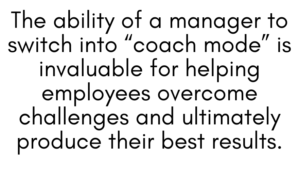While managers traditionally plan, organize, and assign tasks, exceptional managers establish a purpose their teams can unite behind and work together to achieve. They harness the talents of their team by taking the time to listen and understand, involve them in decision-making, solicit feedback, and show them opportunities for long term growth and advancement. 
They challenge team members to find the answers within themselves and to set their own goals. They guide people towards attaining their ambitious goals by helping them practice the skills needed to excel. In short, they coach their teams to success.
The Role and Importance of Team Coaching
A Harvard Business Review report defined coaching as “a style of management primarily characterized by asking employees questions that help them fulfill their immediate responsibilities more effectively and advance their development as professionals over time.”
A leader who acts as coach brings much more to the table than a leader limited to administration or delegation of tasks. The ability of a manager to switch into “coach mode” is invaluable for helping employees overcome challenges and ultimately produce their best results.
When a manager starts thinking and acting like a coach, their team members benefit exponentially: 
- They get the support and encouragement to reach peak performance levels,
- They learn in meaningful ways that help them grow and advance their careers,
- They get constructive feedback they can apply and benefit from,
- They are given the space to work on problems and discover solutions,
- They thrive within an environment that fosters independence and self-confidence,
- They more quickly acquire the skills essential to the organization’s prime needs.
Principles of Effective Coaching
Good coaches practice their art with an understanding of these widely accepted principles:
- The coachee (the person being coached) has the answers. The coach’s job is to help them find those answers.
- The coach is a catalyst, not a change agent. Coaches don’t create change. Instead, they provide the environment, guidance and encouragement for coachees to effect change themselves.
- The coachee is accountable for their progress. The coach creates the foundation, but the coachee must do the work.
- The coach is passionate about assisting in the change process. Coaches are driven to see their clients succeed.
- The coaching process is built on trust. Coaching conversations are confidential and the coach/client relationship is sacred in that way. This last item may prove to be somewhat challenging to a leader coaching their own team members. Thus, they should be clear in setting boundaries about what topics should be discussed when they are wearing their coach’s hat.
When leaders are coaches, they’re focused on helping their team gain both short-term and long-term wins. Coaching leaders strive to keep the positive momentum moving forward, helping people grow their careers by gaining short-term wins while working toward long-term goals.
Characteristics of a Successful Coach as Leader
For a manager to be successful in a coaching role, there are several characteristics they must embody. Real coaching is not about “I talk, you listen” communication. It’s about connecting with the coachee on a deeper level that evokes awareness, inspires change and stimulates action. Here are some traits a good leader/coach embodies:
Non-Authoritative Approach: The coaching relationship is not built on the coach being in power over the coachee. Rather, the coach and coachee are working cooperatively to reach predefined outcomes. The coach is only in charge of the process and structure, but is not responsible for setting the agenda or leading the discussions.
Highly Focused Listening: Being a highly focused listener means the coach is fully engaged in the coaching conversation. They listen carefully to detect what’s really happening within the coachee to reveal important truths and powerful solutions.
Ask Evocative Questions: They ask probing open-ended questions that inspire coachees to arrive at their own conclusions. Their questions don’t include complex language or jargon, and generally start with words such as “what, how, when, where.”
There are No Hidden Agendas: An effective coach doesn’t have an emotional attachment to situations described by the coachee. They’re honest and direct, yet respectful. They also do not lead the coachee in a predetermined direction that they feel is right. They are on a journey of discovery with the coachee.
They Provide Direction and Tools: The coach provides the coachee with tasks and tools to help them move toward their goals and support the desired transformation. These could include journaling, writing down observations, confronting difficult situations, etc.
Managers who apply these coaching techniques motivate the employee to transition their thinking from problem to solution. They foster creativity in the employee to uncover and tap into fresh potentials and possibilities. As a result, employees realize a greater awareness of their ability to contribute to the strength of their team. And through that realization, and subsequent commitment to positive action, the whole team’s performance can flourish.
 The coaching leadership style is unlike other leadership styles in that other styles don’t always focus on employee growth. The coaching leadership style focuses on continuous feedback, on open and thought-provoking communication, and on helping people find the ways to develop themselves. Just as with a sports team, the manager/coach is committed to making each team member better and stronger to build the team’s success.
The coaching leadership style is unlike other leadership styles in that other styles don’t always focus on employee growth. The coaching leadership style focuses on continuous feedback, on open and thought-provoking communication, and on helping people find the ways to develop themselves. Just as with a sports team, the manager/coach is committed to making each team member better and stronger to build the team’s success.
Isn’t that the kind of manager you’d like to be? If you or your leaders aren’t coaching already read about the role of executive coaching in leadership development.
If You Aren’t Coaching Already, Now is the Best Time to Start
While many leaders embrace the need for coaching, they’re not adequately trained on how to be a successful coach. That’s where we can help. As a specialist in coach training, we have the experience and expertise to help you become the effective and respected coach/leader you’ve always aspired to. We can run private classes within your organization to train your managers to add coaching capability to their skill sets. Alternatively you can send your managers to one of our upcoming executive coach training and certification seminars run several times each year.
Contact us to learn more about these options.
Here are more articles and videos related to this article:
Articles
- Why Leaders Should Learn to Coach
- The Democratization of Leadership Coaching
- Why coaching is so powerful
YouTube Videos
- Intro to Becoming an Executive Coach
- Could Team Coaching be Good for Your Leadership Team
- How to Have Better Sensitive Conversations as a Leader
- Transforming Conflict at Work into Success as an Executive Leader
Photo copyright: Featured photo is from ©Karolina Grabowska via Pexels. Secondary photo is from ©RDNE Stock project via Pexels.







